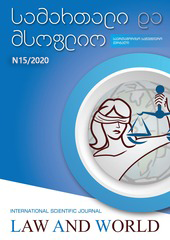Cognitive Phraseological Variations in Terminology of Public International Law and Its Application in Translation into Farsi 
##plugins.themes.bootstrap3.article.main##
ანოტაცია
For the past twenty years, “phraseology” has been considered a very important topic of study for various specialized languages. The linguistic view that used to see phraseology such as “idiom researches and lexicography classifying various kinds of idiomatic expressions” has changed meaningfully. Nowadays, thanks to these changes, the new view is focused on identifying and classifying phraseology as well as applying them to research in theory. That is why we would do well to try to define new horizons of phraseology in different specialized languages. The language of interest here is the prescriptive and descriptive language of international law instruments. We should consider this language as the normative language of judges, legislators, courts and international lawyers. These practitioners – who use specific types of phraseology and stable linguistic structures –should perhaps adhere to the use of a professional language that conforms to recognized standards of normative rules. This paper, therefore, tries to define the main relations between phraseology studies and IL Latin expressions and their systematic-semantic equivalences in languages with different roots like Farsi.
##plugins.themes.bootstrap3.article.details##
როგორ უნდა ციტირება

ეს ნამუშევარი ლიცენზირებულია Creative Commons Attribution-ShareAlike 4.0 საერთაშორისო ლიცენზიით .





